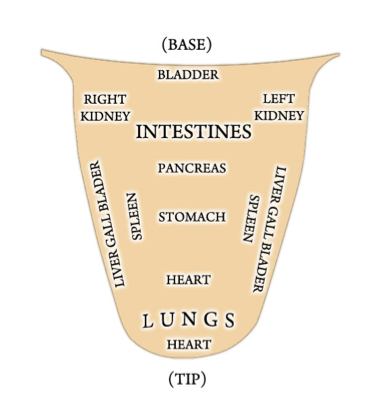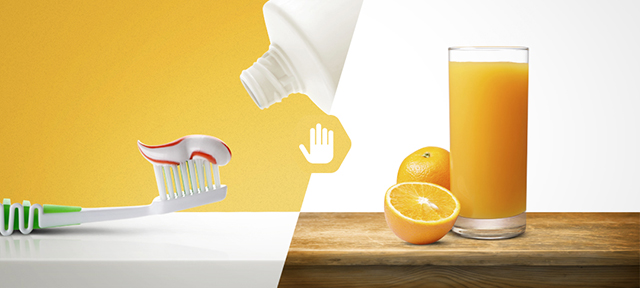Wednesday, 20 May 2015
Wednesday, 15 April 2015
5 Reasons to scrape your tongue everyday!!
5 Reasons to Scrape Your Tongue Every Day
#1 Improves the breath:
Removing the bacteria, food debris, fungi, and dead cells from the tongue significantly reduces the odor from the mouth. You may have been told to use your toothbrush for this purpose, but brushing the tongue does NOT efficiently remove all of the film that develops on the tongue. You will be blown away the first time you do this by the amount of gunk that comes off of the tongue.
#2 Improves your ability to taste:
Removing build-up from the surface of your tongue will better expose your taste buds. This will lead to better enjoyment of the flavors of your food. Ayurveda teaches that the better we enjoy and savor our food, the better our bodies digest and assimilate, leading to better over all health. Also, Ayurveda teaches that blocked taste buds and tongue receptors interferes with our body’s ability to communicate with our brain about what types of foods we need to maintain our health, leading to false cravings.
#3 Avoid toxins being reabsorbed into your body:
As you sleep, your body is detoxifying. Much of the film on your tongue is toxins excreted from your body. You don’t want to re-ingest that do you? NO! Scraping your tongue first thing in the morning will remove this sludge from your tongue and from your body, improving your over all health and improving your immune system.
#4 Improves dental health:
By removing bacteria and toxins, you are also contributing to better dental health as well, leading to healthier teeth and gums. The bacteria that you remove from your tongue are responsible for things like periodontal problems, plaque build-up, tooth decay, gum infections, gum recession, and even loss of teeth.
#5 Get to know your tongue:
Did you know your tongue is a mirror reflection of your internal organs? Just like with hand or foot mapping, the tongue is mapped out to reflect various parts of your internal body. You can learn so much about what is going on in particular areas just by looking at your tongue every morning. Also, by scraping your tongue, you are actually stimulating and massaging those corresponding internal organs, just like in acupressure or acupuncture. Pretty cool, huh?
Tuesday, 7 April 2015
TOOTH SENSITIVITY
Hard To Ignore But Easy To Treat
Ever wonder why every
time you have a spoonful of icecream you inevitably end up touching your face.
Every time you sip on
your fruit juice you sense a twinge in your mouth!! Here is the answer:
“ your teeth are sensitive “
Almost half the population experience sensitivity and it
usually occurs due to wearing away of the enamel which is the outermost
protective layer of the teeth.
Due to wear of the
enamel there is exposure of the softer layer of teeth which is the dentin,
which has tiny tubes that contain nerve endings which are filled with fluid.
Eating /drinking any
foodstuffs that are hot or cold or any sweetened item cause this fluid to move,
resulting in discomfort to the nerves causing: sensitivity.
It usually occurs
due to receding of the gum line, caused by overzealous brushing or using an
abrasive tooth paste
Those who have a habit of grinding
teeth during stress or during sleep are at a high risk of developing Sensitivity
as grinding too wears the enamel exposing the dentin
Fruit juices and cold
drinks are high in acidic content, eat away the enamel causing sensitivity.
How To Reduce sensitivity
Surgical gumgraft If root of the teeth has lost gum tissue
Avoid
overzealous brushing, use soft bristled toothbrush
Brush regularly
with a desensitizing toothpaste
Application of fluoride to sensitive areas of teeth
Reduce the intake of acidic juices and fruits
and when consuming
Use a straw along with it so there
is minimum contact with the teeth
For those who have a habit of
grinding teeth nightguard should be used
Surgical gumgraft If root of the teeth has lost gum tissue
Regular check ups at iDENT, will keep your teeth healthy and smiling.
Idyll Dental
002 40147049
www.smileident.com
Friday, 3 April 2015
Monday, 30 March 2015
CLASSIC MORNING MISMATCH
ORANGE
JUICE &TOOTHPASTE!!
Ever felt a bitter taste after
consumption of orange juice soon after brushing??
Who would have thought your early morning
source of vitamin c had your taste buds turning your mouth sour .
Basically the sodium lauryl sulphate
of the toothpaste suppresses your sweet
receptors&has a dampening effect
on the generally sweet taste of orange
This sulphate destroys the phospholipids in our body which
enhance our
sweet receptors, Thereby the sls inhibits the sweet receptors
and this is how
your sweet taste of orange turns sour.
So next time when you consume your
vitamin c source see that you have given a gap of half hour after you have
brushed.
Thursday, 12 March 2015
Dental fillings –
what you need to know
When you have a cavity
in your mouth, your dentist may suggest you get it filled,
so all thanks to
technological advances, dentists and patients today have several
choices when it comes to selecting materials to fill cavities. But still
one of the most
common misconceptions we find in dentistry,
is that most people think that all white
fillings are the same. This is far
from the truth.
There are fundamentally two types of white
fillings, porcelain and resin. We often
compare the different between porcelain fillings and resin fillings to
the difference
between your plastic picnic plates versus your fine china dinnerware.
They are like chalk
In terms of terminology plastic white filling can be referred to
composite or resin.
Porcelain fillings are often called inlays, ceramic. Both types of
restorations utilize the
same blue light, it is
used to set hard the cement material. The
resin is placed in soft and set
hard with
the light, whereas the porcelain restorations are hard prefabricated filling
that is
bonded
into the cavity. When a filling is on the larger size requiring corners or what
is termed as
cusp
replacements. We always recommend porcelain reconstruction of the tooth to
ensure that
you are
not back in the dental chair fixing the same tooth again anytime soon.
Porcelain or Ceramic fillings have excellent
aesthetics. It restores natural appearance of the tooth. These fillings are
more resistant to staining than composites. Compare to silver fillings they
offer a metal-free alternative to your filling needs. For those concerned with
environmentally conscious dentistry and to limit their exposure to metal
toxins, then ceramic fillings are a viable alternative to filling your
cavities.
Again comparing to metal fillings Ceramic fillings is generally much more
resilient and less susceptible to their metal counterparts. The porcelain
material commonly used in ceramic fillings can last more than 15 years and,
additionally, are typically much stronger then the silver used in metal
fillings, consequently providing greater protection from the filling breaking
and the need to have then repaired.
At I DENT, both options of white
fillings are readily available. It’s a matter of working out
with you which
option best suits your expectations and budget
.
Thursday, 5 March 2015
Subscribe to:
Posts (Atom)










